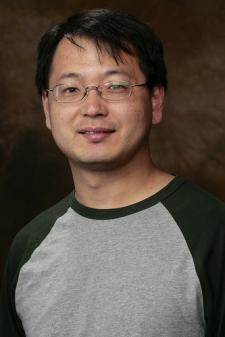Atomic Particles Help Solve Planetary Puzzle
FAYETTEVILLE, Ark. – A University of Arkansas professor and his colleagues have shown that the Earth’s mantle contains the same isotopic signatures from magnesium as meteorites do, suggesting that the planet formed from meteoritic material. This resolves a long-standing debate in the field over the planet’s origins.
Fangzhen Teng, assistant professor of geosciences at the University of Arkansas, and Wei Yang and Hong-Fu Zhang of the Chinese Academy of Sciences report their findings in Earth and Planetary Science Letters.
The researchers examined magnesium isotopes in chondrites – meteorites containing elements formed from the condensation of hot gases in the solar system. They also looked at samples from different depths in the Earth’s mantle. Isotopes have the same chemical properties, but different weights, so some processes cause what looks like the same material to behave differently. The different proportions of isotopes within a rock can tell scientists something about the original source of the material.
Magnesium makes a particularly good marker for planetary origins because, first, isotopes of magnesium can be separated during evaporation and condensation in the solar system and, second and more uniquely, one isotope of magnesium, Mg26, is a decay product of Al26, which existed in the early solar system for less than 5 million years. Thus, materials with different origins and ages contain different amounts of Al26, which results in different amounts of magnesium isotope.
“Isotopes are very sensitive to sources of material,” Teng said. “We can use isotopes as a tool to further understand planetary origins.”
Teng’s group analyzed different types of rocks from different depths of the Earth’s mantle from a site in North China and compared the results to those of samples from chondritic meteorites. They looked at magnesium isotopes in samples from the whole rock, but they also separated out minerals from the rocks and examined the magnesium isotope composition of these minerals as well.
“The samples from Earth were slightly different from one another,” Teng said. Their compositions also matched closely with those of the meteorites, the researchers report.
“That’s very strong evidence that Earth has a chondritic magnesium composition,” Teng said.
Teng is a professor in the J. William Fulbright College of Arts and Sciences and is a member of the Arkansas Center for Space and Planetary Sciences.
Teng’s research is funded by the National Science Foundation.
Contacts
Fangzhen Teng, assistant professor, geosciences
J. William Fulbright Colleges of Arts and Sciences
479-575-4524,
fteng@uark.edu
Melissa Blouin, director of science and research communication
University Relations
479-575-3033,
blouin@uark.edu
Headlines
U of A's Inspirational Chorale Makes Its Carnegie Hall Debut
The U of A's Inspirational Chorale took center stage at Carnegie Hall in March, performing under the direction of professor Jeffrey Murdock to a packed audience at the iconic Stern Auditorium.
The State of Economics With Mervin Jebaraj Set for June 5
U of A economist Mervin Jebaraj will analyze state's economic trends and regional issues in an upcoming talk. Preregistration is required by May 31.
Faculty Demonstrate Dedication to Student Success Through Teaching Credentials
Eight faculty members from across the U of A have earned the prestigious Association of College and University Educators certification in Effective College Teaching.
Artificial Intelligence, Machine Learning Boost Arkansas Animal Science Research
Aranyak Goswami, a bioinformatics specialist, will work with three different departments to boost the research arm of the U of A System Division of Agriculture.
College of Education and Health Professions Doctoral Student Picked for Grosvenor Fellowship
Jessica Culver, a doctoral student in the College of Education and Health Professions Adult and Lifelong Learning program, has been selected as a member of the 2024 Grosvenor Teacher Fellowship.





